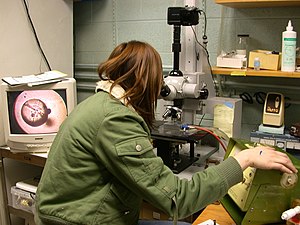- Image via Wikipedia
Last year, I spent a lot of time exploring the many new social networks for scientists that hit the market. At the time, my conclusions were that most, if not all, failed to offer anything that the scientists I work with were interested in doing; that the networks demanded a significant time commitment; and that scientists (at least biologists) were ignoring them in droves. I haven’t spent a huge amount of time with these networks since then, as there hasn’t been anything particularly new or exciting offered, and participation still seems to be lagging. David Bradley at the Sciencebase blog has done an excellent recent review and it appears that things haven’t changed very much:
“The point of all these various social networking, social media, and other online tools is communication. However, with the majority of scientists feeling perhaps that they are already well-served by their existing ‘meat-space’ networks they just do not see the point. And many of the current offerings do not immediately appear to be of value: there is no ‘killer app’ to draw practicing scientists in…”
Bradley gives what I think are overly generous estimates of use of the sites, given the level of traffic one sees on most. Using sheer numbers of members is always problematic since so many people sign up, take a look around, and never return. Numbers of members actively posting in the last week/month are much more telling, but very few sites are willing to give out such data. Proponents of such networks argue that we’re still in early days and that eventually, membership will grow. Personally, I think that ship has already sailed, at least for the current set of offerings. The issue isn’t a lack of awareness of social networks–who hasn’t heard of Myspace or Facebook?–but instead is a lack of compelling reasons to participate. There was a point, around the launch of the Nature Network, where these sorts of sites received all sorts of attention and coverage, both in the formal science press and in the blogosphere. Most biologists I’ve spoken with who tried them found they weren’t particularly useful. I used to get asked about them all the time. Now, it’s rare that they’re even mentioned. I don’t expect to see mainstream buy-in unless there’s a major shift in what the sites have to offer, some new paradigm that’s more attractive, the “killer app” mentioned above.
There’s also an idea that as Generation “F” (for “Facebook”) scientists enter the lab, they’ll be well-seasoned in using social networks, and will expect to employ them as scientists. That may be true, but the problem is that those early graduate students have the least to offer any social network. They haven’t yet done the research, so they have little by way of results to communicate, they’re unlikely to be in charge of setting up collaborations for the lab and because of their inexperience, have the least practical advice for others. By the time they can offer useful contributions to a network, they are likely to be too busy to spend much time on a network and will probably be indoctrinated into the more traditional ways of networking. It’s something of a paradox in this field, those most likely to participate are the least valuable to other network members.
Most networks seem to make two assumptions that doom them to failure: 1) that networking and communication is a central part of a scientist’s day, and 2) that scientists are willing to openly communicate on a wide scale with their communities. The first is a failure of perspective, those building and promoting social networks are “true-believers“, people whose lives revolve around social networking. While communication of results, networking and building collaboration are important for scientists, they’re somewhat peripheral compared to doing actual research. These are things one does in addition to one’s “real” work, performing experiments and seeking funding is often more important as well. Finding collaborators is at best, a sporadic event, not something done often. Any network that asks for regular participation and priority in time and effort will fail for this reason.
The second issue stems from a fear of prematurely exposing one’s data and a hesitancy to offend anyone who might later be deciding on your grants, reviewing your papers or hiring you or one of your students. Much data is hard-earned and while a vocal minority promote Open Science, the reality of it is that most researchers are very protective of the fruits of their labors. They want to feel they’ve fully exploited their data before releasing it to their competitors. And while many scientists respect thoughtful criticism and enjoy debating the meaning of their results, in general, the field has become more and more polite, more and more timid. Where questions asked after a seminar used to try to poke holes in an argument, now those sorts of discussions have moved into private groups. If you want to hear people’s real opinions of a talk, don’t listen to the questions asked in public; instead, head to the bar later that day for a one-on-one discussion.
Scientists tend to have fairly small trusted circles, and opinions (at least negative ones) are only expressed within these small groups. Your preliminary data is only exposed to your labmates, perhaps to your department or a group of collaborators. It’s unlikely you’ll see truly open communication beyond these sorts of groups (especially from the younger scientists mentioned above) due to fear of committing career suicide. Both are unfortunate, but are parts of the current culture. Any network that hopes to succeed must adapt to the culture of the community, rather than trying to rewrite it. Networks can work on the level of these smaller groups, and there is certainly some benefit in providing more efficient ways for labmates to keep each other up to date. But by working on this level, one loses the positive effects of scale, the benefits of receiving varied opinions, and advice from beyond one’s circle.
Even if these issues are addressed, mainstream acceptance is not a given. It’s very difficult to replace a system that for most scientists, already works pretty well. Krueger, again, from the article:
“For adoption of new technologies in science, it has to be an order of magnitude more useful than current tools,” says Krueger, “We just don’t have the time to waste learning new tools that only marginally increase our productivity.”
Discussion
22 Thoughts on "Scientists Still Not Joining Social Networks"
Thanks for the shout out. Glad you enjoyed my article. Your conclusions pretty much coincide with mine.
Just on a point of order, the usage estimates were not my over-generous numbers, they came from interviews with the various site owners…
Among a significant percentage of vertebrate paleontologists, Facebook has become the social networking medium of choice. It’s pretty widely used, by a diverse cross-section of the field. I use it to keep track of what my colleagues are doing (who is submitting what at the moment, what taxa are in description or not, who has a new paper out) as well as for the social aspects with colleagues/friends. When someone posts a “hot” topic, it is always interesting to see who comments – everyone from past presidents of the professional society, to tenured faculty, to graduate students. Perhaps the buy-in in our relatively small field is higher than elsewhere. . .
I think different fields vary widely. What the physicists are doing with arXiv.org and what MD’s do on their social networks are very different from what biologists or chemists do. It’s interesting to see that your field has found use on a general platform, which may be a more likely future than one aimed solely at scientists.
Very well put, David. The idea that large numbers of researchers will use social networks to discuss research or conduct any serious collaborations may be assuming the stereotype of the scientist in the ivory tower of academia carrying out science for its own sake. In fact, as Steve Shapin points out in a 2008 article in Seed (http://bit.ly/1FhUEr), two-thirds of American researchers (all science and engineering degree holders) work either in the for-profit sector or are self-employed. Only 9% work in academia. About 70 percent of all R&D in dollar terms is now for applied science done in the commercial sector. In this context Merton’s observation in his famous article about the “Matthew effect” applies:
“Current renewed tendencies toward secrecy, and not alone in what Henry Etzkowitz has described as ‘entrepreneurial science’ will, if extended and prolonged, introduce major change in the institutional and cognitive workings of science.” (http://bit.ly/3X5mv7)
In the arguments for Open Science, we often forget that each norm of science is balanced with a counter-norm: objectivity with dogmatism, openness with secrecy.
Citing the sociologist of science, Robert Merton, Ian Mitroff sums up your claim that scientists aren’t so eager to share their data:
“Whatever the ultimate implications of the study, it has long been an unwritten rule of science that you don’t divulge what you’re up to until you’re 99% sure that you’ve got the competition beat in the race to print (cf. Merton, 1957).” (p.593)
Mitroff, I. I. 1974. Norms and Counter-Norms in a Select Group of the Apollo Moon Scientists: A Case Study of the Ambivalence of Scientists. American Sociological Review 39: 579-595.
I keep asking my fellow molecular biology colleagues if they use Facebook, and so far none have said they do. However, 80-90% of the PhD scienitsts I know who are working in the biotech and pharma industry are already on LinkedIn, and are using it more and more — maybe because LinkedIn takes minimal time to set up and maintain, and is focused on professional, not personal, ‘social networking’.
In recent e-mail correspondence, a fisheries biologist friend of mine dismissed out of hand the possibility of participating in an online social network for professional purposes. I wonder if he knows his math-gal wife’s on Facebook. (I’m not going to tell.)
An additional thought — at risk of sounding a little ‘snarky’.
The quality and usefulness of a social network is entirely dependent on its participants and how they make use of the virtual space. The character of a group can’t be programmed into an online app yet, as far as I know. The whole can be either better, or worse, than the sum of its parts.
I find Facebook to be a time-*saver*. But that is because of how I use it. On Facebook you *can* create a virtual zoo — but it’s not compulsory. Really.
Our research, based on empirical evidence and published, described this phenomenon in some detail in May 2008.
Interim Report: Assessing the Future Landscape of Scholarly Communication.
http://cshe.berkeley.edu/publications/docs/SC%20Draft%20Interim%20Report%20060808.doc.pdf
We are preparing the final report of this study for publication in the coming months.
Best,
Diane
The small scale, semi private groupings that scientists operate within have a strong effect on their willingness to participate in social networks. The stronger the competition and the closer the potential of money, the less likely they are to participate in public.
I do think that there is scope for using social networks within science, but perhaps some of the initial attempts were a but naive. Neither science, nor the potential for the social web will disappear, more likely is that those that can more openly participate (arXiv) will show those less willing the benefits and over a 5-10 year span more people will participate. RSS took seven years to gain widespread adoption. Social network tools will take just as long to become widely adopted, even with Facebook at 200 million plus current users. Semi-private networks are a definite area where this will become more popular, but they are not that well supported at the minute.
Not speaking for Nature.

![Reblog this post [with Zemanta]](http://img.zemanta.com/reblog_e.png?x-id=831e2b43-4a0c-40cd-9e1a-bc84457933ad)


